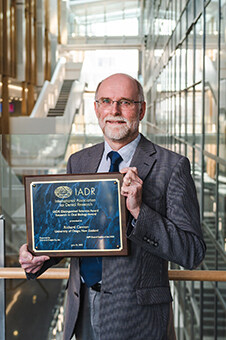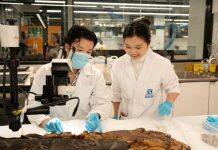A University of Otago researcher has received one of the most prestigious awards bestowed in international dentistry for his research into oral diseases.


Deputy Dean of the Faculty of Dentistry at Otago, Professor Richard Cannon’s outstanding research in oral microbiology has been recognised with a Distinguished Scientist Award for Research in Oral Biology from the International Association for Dental Research (IADR).
“I am extremely honoured to receive this acknowledgement from the international dental research community,” Professor Cannon says.
His work as a molecular microbiologist has held his interest over the last 37 years.
“Microbiological research is very engrossing because microbes are evolving so fast – you come up with a solution but then they evolve a way to get around that. You’re never finished, there’s always more to do, because the microorganisms replicate so fast and mutate and change,” Professor Cannon says.
Professor Cannon’s research investigates how microorganisms cause oral diseases and how treatments for patients with these diseases can be improved. It is particularly focussed on the yeast Candida albicans which causes infections in various sites of the body, including the mouth.
“As Candida develops drug resistance there are continual challenges in drug development to get effective drugs that don’t harm us, that kill the microorganisms and that might be long lasting,” Professor Cannon says.
He has made many breakthroughs during his prestigious career. This includes developing a set of tools that could, for the first time, study the function of genes in C. albicans. These tools have proved to be very useful; they have been requested by, and supplied to, 48 laboratories in 13 countries.
Professor Cannon has also made major contributions to the understanding of fungal drug resistance and compounds that overcome that resistance, he has also undertaken seminal research on the role of saliva in oral colonisation of C. albicans.
Professor Cannon completed a biochemistry undergraduate degree and went on to focus on Candida research for his PhD with the Department of Biochemistry microbiology unit at Cambridge University in the United Kingdom.
When he became a member of the Faculty of Dentistry some 35 years ago, he had no dental background. He joined because of a strong group at Otago doing research on Candida, including Professor Max Shepherd who set up the Experimental Oral Biology laboratory in the Faculty of Dentistry.
“There has always been a very strong research group in the Faculty of Dentistry in molecular microbiology and oral biology, and it’s been a real pleasure to work with a number of wonderful staff and students over the years who have contributed greatly to this research,” Professor Cannon says.
Professor Cannon made the deliberate decision to pursue an academic career, rather than in the private sector, as he enjoys teaching and sharing knowledge, and the greater freedom in research. He says his career breakthroughs have come through collaboration, including with international colleagues.
Dean of the Faculty of Dentistry Professor Michael Morgan says Professor Cannon has been an outstanding leader whose sensible and pragmatic approach has garnered praise and respect from his colleagues, alongside his research abilities.
“Through the IADR and the Sir John Walsh Research Institute, I’ve known of Richard’s outstanding research abilities for many years. Across this time, in the world of dental research and microbiology in particular, Richard’s name has always ranked as a leading light. This prestigious award is extremely well deserved and a fitting tribute to Richard’s international research reputation and prowess,” Professor Morgan says.
This award was announced at the IADR’s 2022 General Session, held virtually on 22 June.







































